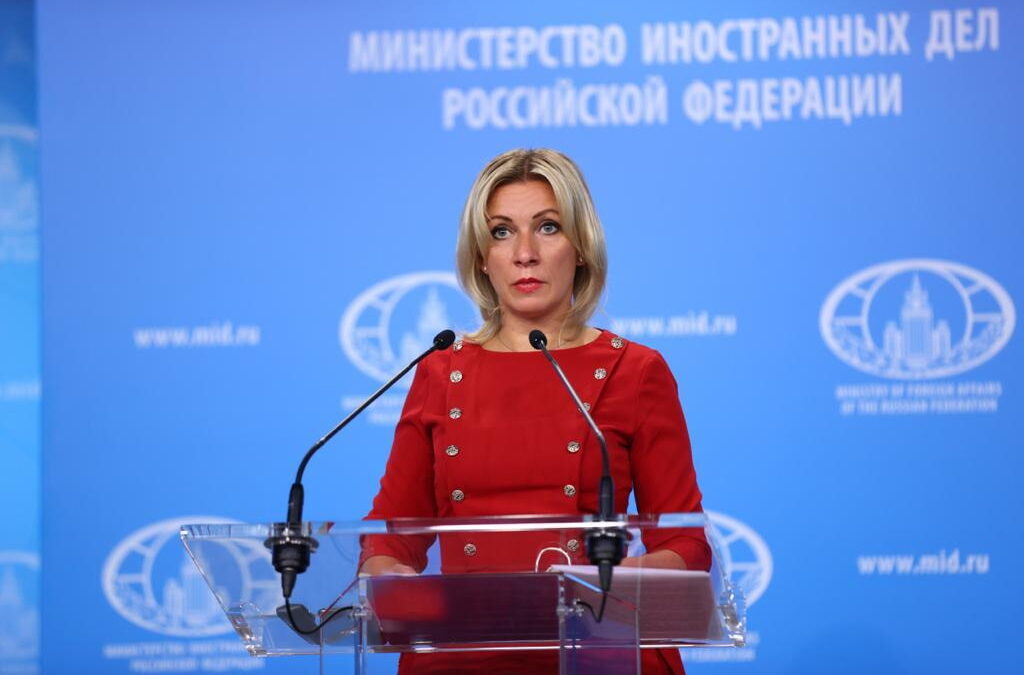Russia has accused Poland of violating the “accepted norms of international law” by seeking to interfere in Belarus’ internal affairs and undermine its sovereignty.
“The Polish authorities continue to openly interfere in the domestic affairs of the Republic of Belarus,” said Russian foreign ministry spokeswoman Maria Zakharova at a press briefing.
“The Polish leaders are at the forefront of the EU’s unfriendly policy towards Belarus and they promote the toughening of EU sanctions against Minsk,” she continued. “Belarus unequivocally sees Poland’s actions as obvious attempts to interfere in its internal affairs.”
Her comments follow a diplomatic spat between Belarus and Poland last week, after embattled Belarusian president Alexander Lukashenko accused Warsaw of seeking to reclaim former Polish lands that are now part of western Belarus.
Zakharova echoed such claims, saying in her briefing that “statements by Poland’s head of state on the readiness ‘to protect’ certain regions in neighbouring Belarus are a source of concern”.
There have been no reports in Poland of the president, Andrzej Duda, making any such statement. Nor has the Polish government made any suggestion of seeking to reclaim territory from or militarily intervene in Belarus.
Zakharova also criticised Poland for “openly supporting opposition forces” in Belarus “via NGOs under its control” as well as by “creating a financial and organisational base in Poland for an opposition that is engaged in illegal activities”.
Her remarks may refer to Nexta, a Belarusian opposition news source that has served to mobilise and coordinate protests. It is run from Warsaw by Stepan Svetlov, who has previously worked with Belsat, a Polish state-funded television channel aimed at Belarus. Svetlov has applied for political asylum in Poland.
“We urge Warsaw to return to the universally accepted norms of international law and renounce its policy of undermining the sovereignty of its neighbour,” concluded Zakharova.
"@Nexta_tv founder Stsiapan Putsila, now 22, wasn't even born when Lukashenko took power in 1994. Now, he works from exile out of an office in neighbouring Poland, guarded by uniformed police[,]… becoming one of the main sources of news in Belarus" https://t.co/FmKdppgqpK
— Notes from Poland 🇵🇱 (@notesfrompoland) August 28, 2020
Poland’s foreign minister was one of the first to reject the outcome of Belarus’ recent presidential election, at which Lukashenko was declared the winner amid widespread evidence of vote rigging.
“We cannot recognise it as meeting democratic standards,” said Jacek Czaputowicz the day after the election.
The Polish government then announced a “Solidarity with Belarus” plan, allocating 50 million zloty (€11 million) to assist victims of repression, provide scholarships in Poland for Belarusian students and scholars, fund independent media and NGOs, and facilitate migration to Poland.
We “cannot stand idly by during the brutal suppression of peaceful protests in Belarus”, said the prime minister, Mateusz Morawiecki. “The stronger Belarus is, the more secure Poland will be.”
The government’s approach to Belarus has won the backing of Polish opposition parties. Earlier this week, Morawiecki updated them on “Poland’s activities aimed at building international support for democratic transition beyond our eastern border and support for Belarusian civil society”, reports the government’s website.
Poland has also pushed for stronger and more coordinated action towards Belarus from the European Union, working closely with regional allies.
“The Baltic [states] and Poland [have] set the tone for the EU’s current common position on what is happening in Belarus,” said Latvian president Egils Levits yesterday, quoted by The Baltic Times.
During yesterday’s press conference, Zakharova was also asked about Poland’s recent commemoration of the anniversary of the outbreak of World War Two, during which government figures reiterated that Nazi Germany and the Soviet Union were jointly responsible for starting the war.
In response, Zakharova repeated recent revisionist remarks by Vladimir Putin and other senior Russian officials, denying that the Soviet Union was at all responsible for the outbreak of war and suggesting that, in fact, Poland had encouraged Hitler’s aggression.
Poland’s government is now “cynically trying to shift the focus of public attention away from the strategic mistakes made by the Polish authorities before the war and to place the blame on the external forces”, said Zakharova.
The Poles seem to have “forgotten the decisive contribution [of the Soviet Union] to the defeat of Nazism and saving European nations from physical extermination”, she concluded.
Poland has strongly rejected Russia’s recent historical claims, accusing Putin of reviving “Stalinist propaganda” about the Second World War.
Jarosław Kaczyński, chairman of the ruling Law and Justice (PiS) party, earlier this year argued that Poland was owed war reparations not only from Germany, but also from Russia, due to the damage caused by the Soviet invasion and occupation.
Main image credit: Ministry of Foreign Affairs of the Russian Federation

Maria Wilczek is deputy editor of Notes from Poland. She is a regular writer for The Times, The Economist and Al Jazeera English, and has also featured in Foreign Policy, Politico Europe, The Spectator and Gazeta Wyborcza.




















